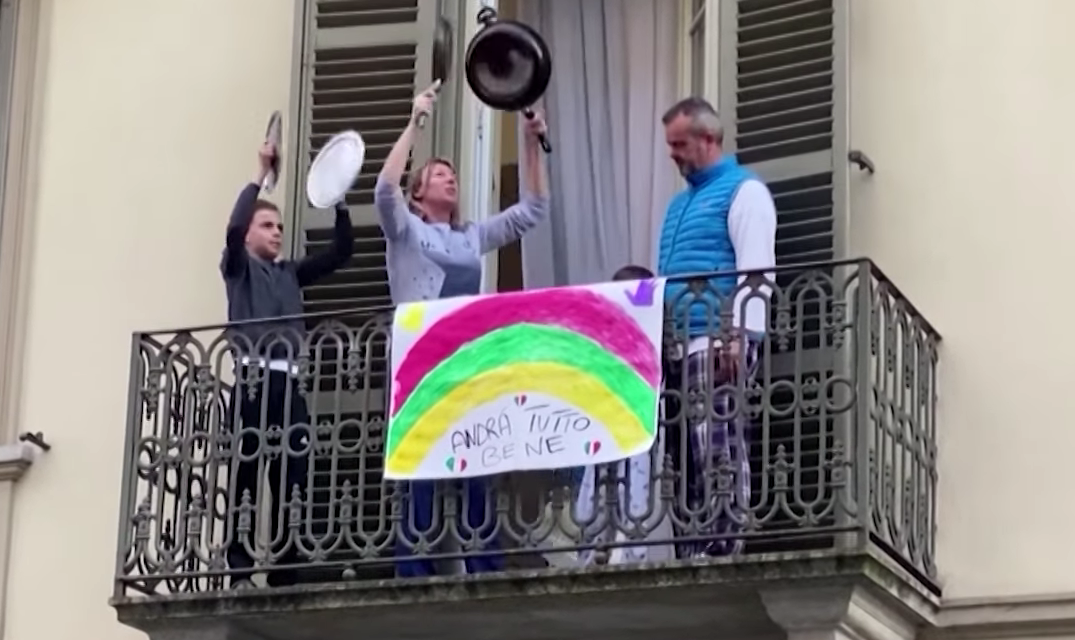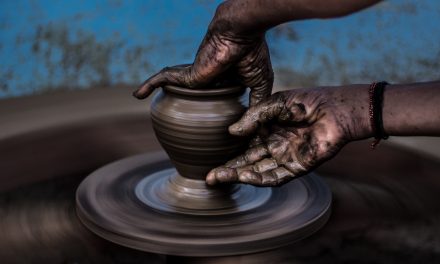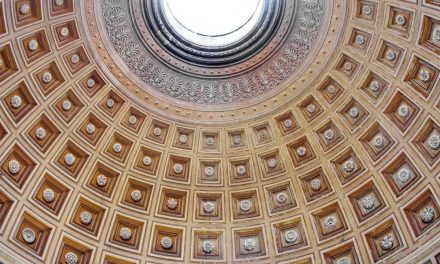This is a teachable moment, which is to say it is a moment of learning, maybe even a moment of conversion. At Catholicmoraltheology.com, we want to grab it.
Like everyone else, my theologian colleagues and I are having to re-invent our daily lives, and the experience can be bewildering. We have been scrambling to adapt to online teaching, homeschooling, social-distancing, canceling plans and coping with anxiety. Many of us are also developing ways to care for our communities, especially those in poverty or without a safe home in which to maintain some semblance of ordinary life.
In the midst of this turmoil, we see an invitation to a deeper understanding of the common good and the virtues most associated with it, especially solidarity.
Here is the way I have described this moment, for my students and colleagues at the University of Dayton.
“It is above all a question of interdependence, sensed as a system determining relationships in the contemporary world, in its economic, cultural, political and religious elements, and accepted as a moral category. When interdependence becomes recognized in this way, the correlative response as a moral and social attitude, as a “virtue,” is solidarity. This then is not a feeling of vague compassion or shallow distress at the misfortunes of so many people, both near and far. On the contrary, it is a firm and persevering determination to commit oneself to the common good; that is to say to the good of all and of each individual, because we are all really responsible for all.” (John Paul II, Sollicitudo Rei Socialis, “On social concern,” #38)
“We are in this together, whether we like it or not” (Gov. Mike DeWine)
In his 2017 inaugural address, President Eric Spina referred to UD as “a university for the common good.” But what is “the common good”? We know that it has to do with equipping students to make a more just world, with being innovative in working for transformation, with the struggle to reduce carbon emissions, with developing a community that is richly and joyfully diverse. But what does “common good” itself add to saying we advocate for justice, diversity, inclusion, and care for creation? More to the point, what does it have to do with social distancing in a pandemic? With our losing half a semester together in Dayton?
The common good, as that term is used in Catholic tradition, names the human fulfillment we attain in common, by the full participation and flourishing of all people. Our full humanity, Catholic teaching holds, cannot be realized in isolation or at the expense of other people’s fulfillment.
To get a handle on this, I often have students do a thought experiment. What goods can you only have by having them together? At first, they are puzzled. In most cases, sharing reduces what I have for myself. If I want a piece of pie and I share it, I get less pie. It’s the same with my appointment with my physician, my bottle of hand sanitizer, and my free time. In each of these cases, sharing what I value means having less of it for myself. But what do you want that you can only have by sharing it with other people?
Friendship or family life are the most obvious answers. We could include a concert or sports event where the thrill of cheering with the other fans is central to the experience. A park or lively downtown district where I can watch and enjoy other people enjoying themselves, where we are in public together is a good we have in common. So is a great class, where the professor and students are all thinking together, searching out new questions and answers in a way that far outstrips the learning we get by reading alone or in a private tutorial. We can call these “common goods.” They are goods that only exist insofar as they are in common.
Health, we are being reminded, is also a common good. For many of us, most days, it may seem that each person’s body is an independent system. But that appearance is misleading. We share one earth, breathe common air, make use of an interconnected food system, and rely on limited medical resources.
“The bottom line is, we are all at risk. The elderly and those with medical issues such as hypertension and diabetes appear to be at higher risk of a severe disease course and death. Children may be spared the consequences of severe disease, though they can be asymptomatic to minimally-symptomatic carriers of the virus – placing those who are vulnerable at higher risk.”
“If our health care system fails, then we will all suffer. If the hospital is choked with COVID-19 patients, people with appendicitis, heart attacks, broken ankles, and so on will not be able to be treated. This is the picture of systemic risk. Everyone is at risk if there is a systemic failure of our health care system, not just those with COVID-19.” (Howard J. Luks et al, “A covid-19 coronavirus update from concerned physicians,” March 14, 2020)
This is not just a truth that applies in a pandemic. It is, in fact, the truth about the human body.
As the social scientist Arthur Frank reminds us in The Wounded Storyteller, the body in illness is not a “monad”—meaning a unit of one—although our entire health-care system is built on this notion: the individual hospital beds, the sense of isolation. Rather, it is inherently “dyadic,” because the body is never not in relation to others, especially in cases of contagious illness. The sick body is always in dialogue with the medical system, with spouses, and so on. Research showing that diabetic patients with empathetic doctors have better outcomes than those with brusque doctors, for example, highlights the material and corporeal reality of Frank’s point: The body is a social encounter, not just a vessel for our hyper-individualism. (Meghan O’Rourke, “The Shift Americans Must Make to Fight Coronavirus.”
That’s a disturbing truth. In the US, we honor self-sufficiency, averting our eyes from the truth that all of us rely on others in childhood, in sickness, in age, and in fact, throughout life, every time we turn on light switches or connect to the internet, every time we drive on a road, every time we buy food, and every time, in fact that we take a breath on this planet that we share.
My body, my own health, is in fact dependent on many other bodies and their health, their participation not only in an economy but in human society.
Our culture praises self-sufficiency. Our long commodity chains hide from us our connections and all too often, our political rhetoric denigrates the full humanity of those whose need is not sufficiently hidden. It’s no wonder that people often feel insulted or threatened when their reliance on others comes to light.
But this dying to the illusion of independence is a moment of new life. There is joy in our interconnection, in our vulnerability to each other. We have seen glimpses of this in balcony singing in Italy, but better examples might be practices of restorative justice, where all of those involved in a case of injustice, the perpetrators, the victims, the bystanders who were also harmed speak truthfully together and together build a path forward.
Still, recognizing that we are bound by common goods is only the first step. “The common good,” as we use that in Catholic thought, refers to the kind of political, economic, cultural, social, material, and spiritual life of humanity that is like a great class. The participation of everyone in it is what makes it good. You can only have that life if we all have it together.
This is why “the common good” is different from “the greater good,” which implies that some individuals’ well being should be sacrificed for the sake of a larger number. As the Compendium of the Social Doctrine of the Church puts it, “Belonging to everyone and to each person, [the common good] is and remains ‘common’, because it is indivisible and because only together is it possible to attain it, increase it and safeguard its effectiveness, with regard also to the future.” (164)
This is not about dreamy idealism. Working for the common good is hard work. People have conflicting interests and serious disagreements. Striving to promote the common good means we cannot manage those by shutting one side down, excluding the less powerful, or repressing the hurt. Political life is a spiritual and moral as well as a logistical challenge, when it is seen as the struggle to bring about the common good.
Building up a common good will be costly, too, especially for those of us who are accustomed to not being accountable to others. Christians might call that a kind of ‘dying to self’ or ‘sacrifice,’ but to be clear, neither of those terms in Christianity are about self-destruction. The costly gift purchases the pearl of great price. For Christians, participation in God’s own dying to self is the heart of discipleship and the path to full life. Or rather, because it is a sharing in Christ’s paschal mystery, it is a hidden, sometimes terrible way we already begin to share in that full life even now in a broken world.
What all of this means is that in this moment of pandemic, we can notice indications that ‘the common good’ names something true about humanity. We can embrace that interdependence by practicing the “firm and persevering determination to commit oneself to the common good” that John Paul II called “solidarity.” We’ve lost something precious, in having to distance ourselves from each other. But if we embrace that cost as an aspect of our solidarity with all in this moment of shared danger, we can discover in it a new and fuller sense of our humanity.
In the fullest sense, the common good is a claim of faith because we have not yet achieved it, in its fullness. We don’t know what it would be like to have all humanity participating together in full life, and we find it hard, sometimes to even imagine it. Christianity says that creation is damaged by sin and that the work of God among us is to heal and redeem what was broken. So we have hope that the universal common good is a reality because it is what God is doing, in the midst of the world’s pain.
That hope is consistent with what reason shows us about our interdependence. The claim of faith simply goes beyond what reason can prove. It urges us to strive for what we cannot yet fully understand. So it opens up a whole new field of work for reason. How will we build up our ability to see and to live in that common good? What kind of scholarship about politics, finance, criminal justice, technology, agriculture, education, communications, psychology, and more can move us in that direction?
This extraordinary moment, in which we are feeling so keenly in our physical and social bodies all of the ways we are interdependent, is a chance for scholars and students to focus on building up our ability to promote the common good of all humanity and our joy in seeing it emerge, even in the midst of shared suffering.






Trackbacks/Pingbacks